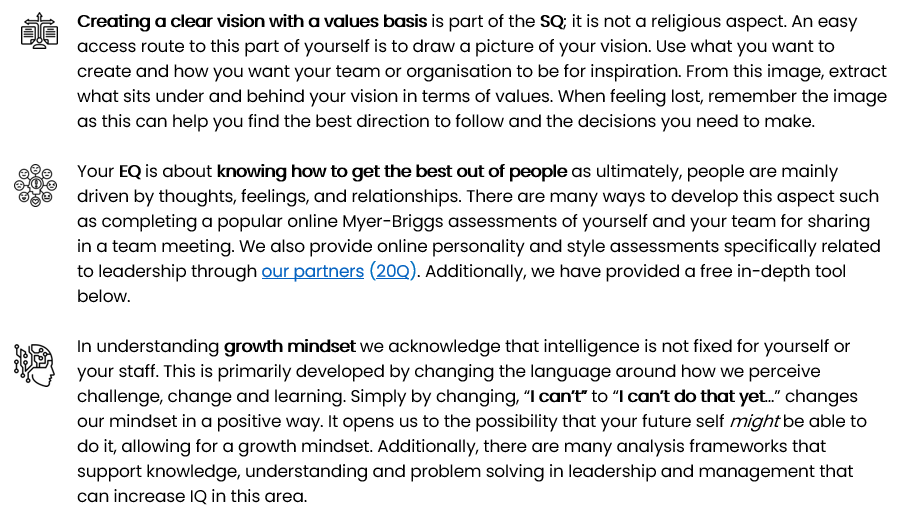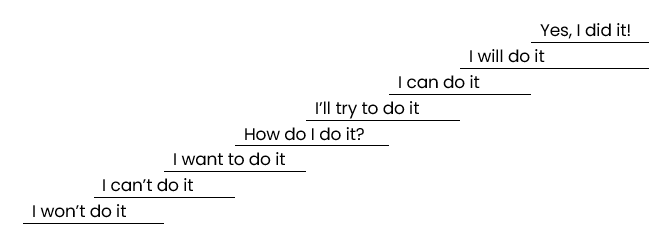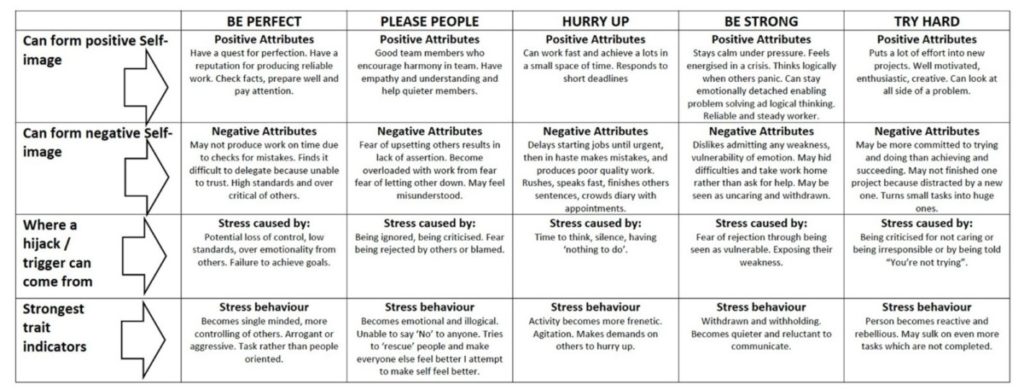Authored by Mark West
In a previous blog I discussed how to improve your leadership through reflection but not which areas of leadership should be developed. I believe balance is the key to almost all aspects of life, and leadership is no exception. Stephen Covey (2004) provides three areas of intelligence to develop to become an effective person: Spiritual Quotient (SQ), Emotional Quotient (EQ) and Intellectual Quotient (IQ). I have taken these and applied them to leadership as I believe more effective people make more effective leaders.
Want the short three-minute version? Here’s a quick read summary:


We spend nine sessions in our leadership and management training course going through these aspects in turn as part of a group. Not got time for that? Look no further than below…
Curious to find out more? Read on for the 10-minute version:
IQ

I discovered the best and simplest way to look at a growth mindset from a teacher sharing ideas with their class of children. The process is no different for adults. The first step is to agree with your team that everyone will start to change their language by adding ‘yet’ to the end of a statement. Our team agreed that if they heard a child or team member saying a statement below, they would simply add the word ‘yet’ on the end for them and encourage them to say it again for themselves.
The statements below go from … to…
I can’t… yet {I can’t yet}
I won’t… yet [I won’t yet]
I don’t know how to… yet [I don’t know how to yet]
From this initial stage, you can see the steps to take on challenges and learn new things, one I used when teaching my partner how to drive:

For a more in depth look at learning and how to learn, click to see ELLI at Bristol University.
EQ

There are a myriad of frameworks and tools to help better understand yourself and others. Whilst we use Myers-Briggs as an introduction to improving EQ, we also use a lesser-known framework in our leadership training programmes developed by Kahler and Hay (1993). I recommend viewing it a row at a time and highlighting with RAG rating (red, amber and green) those statements that apply. You’ll find that most people have one or two main characteristics that apply to them. How does it help? Knowing one another’s triggers for stress means you can support your team better whilst also utilising each other’s strengths better. Sometimes the right person for a task is based on the person, not the role or job description they hold. An important lesson in people management.

If you are interested in a fully comprehensive personality profile, we have partnered with 20Q as part of our training courses.
SQ

Spiritual quotient is about knowing what the right things to do are and making pathways. There are many exercises I use in my business coaching but I’ll summarise three for this quick read:
- Start with the end point in mind. For example, imagine your funeral. What would you want the different groups of people who know you to say about you? Family? Friends? Colleagues? Etc… From these statements, spot the themes and create a personal mission statement based on the characteristics and values you want to personally uphold. One of mine is, “Dance like everyone is watching.” My other eight are for me alone.
- Create a vision (why) and mission (how) for your team or organisation. Why does it exist is about the vision for the future it wants to create. By questioning why does it exist, your answer will relate to the question of purpose that sits in the spiritual arena. This is the existential question and leads to spiritual understanding. How will it get there? How will it do this everyday? These questions lead to an understanding of the mission.
- With your team or organisation, agree upon three to five one-word values and a short one sentence description of each. If your team are struggling to remember it and paper references are required, the descriptions are too long or convoluted, or you have too many values. Review and refine until you have a succinct, relatable and memorable set of values that can be easily understood and shared.
Want additional or more in-depth exercises and support?
Email: mark.west@fdctrainingandconsultancy.org
Twitter: @MarkWest_Teach
Author LinkedIn: Mark West
References
Kahler and Hay by A. Jesson 1993 – Reprinted in Leadership programme for serving Headteachers and Head for the Future, NCSL 2009. Adapted again by MW, 2014
Simon Sinek’s (2011) Start with Why?
Daniel Goleman (2006) Emotional Intelligence; 25th Anniversary Edition.
Steven Covey (2020) Seven Habits of Highly Effective People; 30th Anniversary Edition.
RE Deakin Crick, PM Broadfoot, GL Claxton (2002) Developing an Effective Lifelong Learning Inventory: The ELLI project
